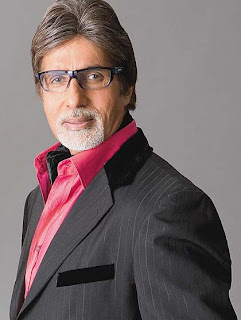 Amitabh Bachchan
Amitabh BachchanThe reigning superstar of Bollywood in the 1970s, Big B's magnificent run came to a stop when he met with a near fatal accident on the sets of the film Coolie. Though he miraculously recovered after long hospitilisation, he was not fit enough to carry on acting like in his salad days. After short stints of acting and retirement which also saw him start his own company ABCL that eventually proved a failure and led him to incur massive financial losses, Amitabh recovered lost ground after the stupendous success of the tele-show Kaun Banega Crorepati which he successfully anchored. He also resumed acting thanks to his great will power, resilience and solid support from family and friends.
Recently, Amitabh admitted that he had liver cirrhosis, a result of the Coolie accident. Apparently one of the donor blood bottles was infected with Australian antigen hepatitis. But Big B is braving the malady with a smile and in addition to blogging has started tweeting as well.
Hrithik Roshan
 Not many know that the mega star has been suffering from a major stuttering problem ever since age 6 and has gone through several painful speech therapy sessions to improve his speech. He continues with speech therapy even now fearing that he may get back to stuttering and incoherent speech.
Not many know that the mega star has been suffering from a major stuttering problem ever since age 6 and has gone through several painful speech therapy sessions to improve his speech. He continues with speech therapy even now fearing that he may get back to stuttering and incoherent speech.
Abhishek Bachchan
Abhishek Bachchan was dyslexic when he was a child and attended a special school. The critically acclaimed film Taare Zameen Par which evolves around childhood dyslexia cites Abhishek's case of a child with dyslexia who went on to not only conquer the disorder but also became a big achiever.
Leander Paes
Lisa Ray
In June 2009, Ray was diagnosed with multiple myeloma and had been undergoing treatment. A stem cell transplant in April this year has completely cured her of the cancer and the actress who put up a brave face all through her battle with the dreaded disease is now back in the thick of action.
Raageshwari Loomba
 The multi-talented Raageshwari has been in the limelight ever since she was a child. She initially began as a model and acted in quite a few films when in college. She started getting noticed when she started VJing for the popular MTV programme BPL Oye. She followed this with a stint as a singer and recorded her own album with her brother Rishabh and also went to do a series of concerts for Coca Cola. Tragedy struck around the year 2000, when she was afflicted with Bell's palsy. She was out of action for an entire year taking time to go through various physiotherapy sessions to set right the twist on her face. After having completely recovered from Bell's Palsy, Raageshwari resumed her career and is a popular face on MTV and TEN Sports. She also works towards promoting various social causes and has even hosted a show called on BBC Quest.
The multi-talented Raageshwari has been in the limelight ever since she was a child. She initially began as a model and acted in quite a few films when in college. She started getting noticed when she started VJing for the popular MTV programme BPL Oye. She followed this with a stint as a singer and recorded her own album with her brother Rishabh and also went to do a series of concerts for Coca Cola. Tragedy struck around the year 2000, when she was afflicted with Bell's palsy. She was out of action for an entire year taking time to go through various physiotherapy sessions to set right the twist on her face. After having completely recovered from Bell's Palsy, Raageshwari resumed her career and is a popular face on MTV and TEN Sports. She also works towards promoting various social causes and has even hosted a show called on BBC Quest.
Gaurav Kapoor
 The ace VJ now a popular presenter was only 22 when he was diagnosed with Type I diabetes. This put a full stop to his wild partying and fun-filled life, something very hard to digest for someone as young as that. Now Gaurav is well in control of his health because of a stringent exercise regimen that includes jogging, yoga and the right diet.
The ace VJ now a popular presenter was only 22 when he was diagnosed with Type I diabetes. This put a full stop to his wild partying and fun-filled life, something very hard to digest for someone as young as that. Now Gaurav is well in control of his health because of a stringent exercise regimen that includes jogging, yoga and the right diet.
Salil Ankola
 The dashing all-rounder made his international cricket debut in the same match as maestro Sachin Tendulkar. Later, in spite of being in the national teams several times over, he never got to play a match which resulted in an additional term in cricket jargon called 'Ankolad'. His cricket career came to an abrupt halt when a tumour was detected on his shin around the year 1997.The affliction resulted in him having around 34 stress fractures. After his cricket career ended Ankola took to acting on the small screen and has acted in several shows like Balaji Telefilms' Karam Apna Apna and also Season 1 of Big Boss. He also acted in a couple of Bollywood films like Chura Liyaa Hai Tumne.
The dashing all-rounder made his international cricket debut in the same match as maestro Sachin Tendulkar. Later, in spite of being in the national teams several times over, he never got to play a match which resulted in an additional term in cricket jargon called 'Ankolad'. His cricket career came to an abrupt halt when a tumour was detected on his shin around the year 1997.The affliction resulted in him having around 34 stress fractures. After his cricket career ended Ankola took to acting on the small screen and has acted in several shows like Balaji Telefilms' Karam Apna Apna and also Season 1 of Big Boss. He also acted in a couple of Bollywood films like Chura Liyaa Hai Tumne.
Lately, Ankola was in news for his alcoholism which was followed by a stint in rehab. Well-wishers says that the cricketer/actor no longer suffers from the problem he even hosted a benefit cricket match in April this year. Let us hope he continues his career as a show biz personality.
Sonali Rathod
 The singer who is married to tabla player-turned singer Roop Kumar Rathod had a serious throat problem in the middle of her career and almost lost her voice. She resumed her career later and was instrumental in her husband's transformation from a tabla player to a singer. Incidentally, Sonali Rathod was first married to noted singer Anup Jalota.
The singer who is married to tabla player-turned singer Roop Kumar Rathod had a serious throat problem in the middle of her career and almost lost her voice. She resumed her career later and was instrumental in her husband's transformation from a tabla player to a singer. Incidentally, Sonali Rathod was first married to noted singer Anup Jalota.
Other notable personalities who took disability in their stride include Sant Surdas, the 14th century singer and composer who was born blind and endured lots of hardship after he was shunned by his family; popular Doordarshan newsreader Sheila Chaman who met with a terrible accident that led to her having around 750 stitches on her face and many plastic surgeries before she resumed her career; wheelchair-bound sportswoman Malathi Holla, a Paralympic gold medallist, former National Badminton champion Rajiv Bagga who was born deaf; and legendary Hindusthani singer Kumar Gandharva who was afflicted with lung cancer at the prime of his career and had to have the cancerous lung removed.
These are but a few of the numerous brave Indians who have battled disability and gone on to shine in their respective careers or taken up an alternative career. Hats of to these brave men and women featured here and those not featured here who live by example.
Source:http://lifestyle.in.msn.com/gallery.aspx?cp-documentid=3929964

Abhishek Bachchan

Abhishek Bachchan was dyslexic when he was a child and attended a special school. The critically acclaimed film Taare Zameen Par which evolves around childhood dyslexia cites Abhishek's case of a child with dyslexia who went on to not only conquer the disorder but also became a big achiever.
Leander Paes

With a string of international championship wins, Leander Paes has put the traumatic period in 2003 when he was hospitalised for suspected cancer, behind him. Luckily for the tennis star, the diagnosis turned out to be negative and he was found to be affected by neurocysticercosis, another name for a parasitic brain infection.
Lisa Ray

A familiar face on the Indian advertisement scene ever since she appeared in a Bombay Dyeing ad with Karan Kapoor, the Canadian-born model, whose father is a Bengali and mother Polish, Lisa Ray has also acted in quite a few films notably Deepa Mehta's Oscar-nominated film Water.
In June 2009, Ray was diagnosed with multiple myeloma and had been undergoing treatment. A stem cell transplant in April this year has completely cured her of the cancer and the actress who put up a brave face all through her battle with the dreaded disease is now back in the thick of action.
Raageshwari Loomba

Gaurav Kapoor

Salil Ankola

Lately, Ankola was in news for his alcoholism which was followed by a stint in rehab. Well-wishers says that the cricketer/actor no longer suffers from the problem he even hosted a benefit cricket match in April this year. Let us hope he continues his career as a show biz personality.
Sonali Rathod

Other notable personalities who took disability in their stride include Sant Surdas, the 14th century singer and composer who was born blind and endured lots of hardship after he was shunned by his family; popular Doordarshan newsreader Sheila Chaman who met with a terrible accident that led to her having around 750 stitches on her face and many plastic surgeries before she resumed her career; wheelchair-bound sportswoman Malathi Holla, a Paralympic gold medallist, former National Badminton champion Rajiv Bagga who was born deaf; and legendary Hindusthani singer Kumar Gandharva who was afflicted with lung cancer at the prime of his career and had to have the cancerous lung removed.
These are but a few of the numerous brave Indians who have battled disability and gone on to shine in their respective careers or taken up an alternative career. Hats of to these brave men and women featured here and those not featured here who live by example.
Source:http://lifestyle.in.msn.com/gallery.aspx?cp-documentid=3929964







